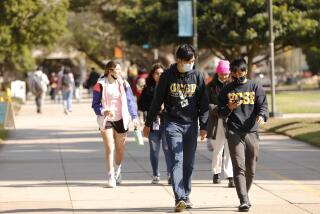Plants Used in UC’s Genetic Engineering Test Uprooted
- Share via
Vandals have uprooted about three-quarters of the 4,000 potato plants in an experimental plot in Tulelake, where scientists from the University of California, Berkeley, are conducting a preliminary test of a genetically engineered bacterium designed to protect the plants against frost, university officials said Tuesday.
The scientists hoped to have all of the uprooted seedlings replanted by this morning, and a planned spraying of the Ice Minus bacterium is to proceed this evening, if weather conditions are right, said UC spokeswoman Lilia Villanueva. The spraying can occur only if there is no wind, according to the permit issued by the U.S. Environmental Protection Agency.
Planting Protested
The potatoes were planted in a one-acre field outside Tulelake in rural Modoc County on April 29. Citizen groups in the area had protested the university’s plans by picketing and filing a lawsuit, but the planting was allowed to proceed.
The vandalism occurred between 6 p.m. Monday and Tuesday morning, Villanueva said. The vandals entered the unguarded, unfenced field and apparently used trowels to dig up about 3,000 plants. They “were laid right beside where they were dug,” she said, and the researchers believe that treated plants were not mingled with untreated ones.
If the treated and untreated plants had been mixed up, she said, the researchers would probably have had to plant a fresh batch of potatoes, setting the experiment back by about a month.
Cold weather in the Tulelake area Monday night protected the uprooted plants from damage, Villanueva added. She said the researchers, biologists Steven Lindow and Nickolas Panopoulos, are confident that virtually all of the replanted seedlings will survive.
Lindow and Panopoulos were assessing the damage Tuesday and replanting the seedlings, and therefore could not be reached for comment.
The test had been delayed since 1983 by lawsuits filed by environmental activists. The current phase is designed to determine how well the bacterium establishes itself on the plants and how easily it migrates to adjacent plants.
The Modoc County Sheriff’s office said they were following several leads in the case but would not release any other information.
Villanueva said university officials were discussing on Tuesday the possibility of placing a guard at the site.
Previous Vandalism
Vandals have also struck at an experimental plot in Brentwood, about 50 miles northeast of San Francisco, where scientists from Oakland-based Advanced Genetic Sciences are testing a similar bacterium, called Frostban, on 2,400 strawberry plants.
On the night before the plants were scheduled to be sprayed, vandals cut through a chain-link fence surrounding the field and uprooted about 2,000 plants. The strawberries were replanted and the spraying took place on schedule on April 24.
The vandals have not been identified, and company officials say no subsequent vandalism has occurred. Since the plants were sprayed, the plot has been guarded around the clock.
A third release of a genetically engineered microorganism into the environment is scheduled to take place in July near Arkansas in Pepin County, Wis. The EPA has tentatively given approval to BioTechnica International of Cambridge, Mass., to test a soil bacterium that has an increased capacity to convert atmospheric nitrogen into a form that can be used by plants. Greenhouse experiments have shown that the altered bacterium can increase alfalfa production by 15% to 17%.
More to Read
Sign up for Essential California
The most important California stories and recommendations in your inbox every morning.
You may occasionally receive promotional content from the Los Angeles Times.













